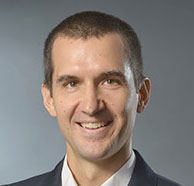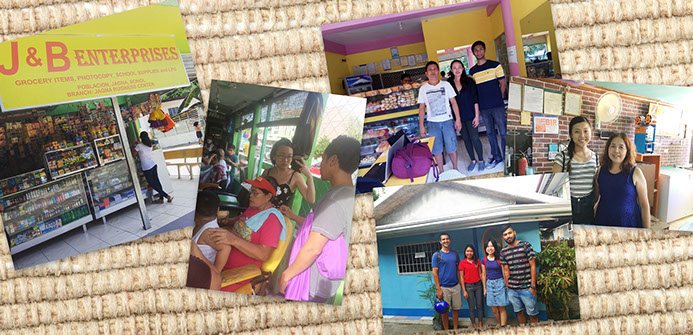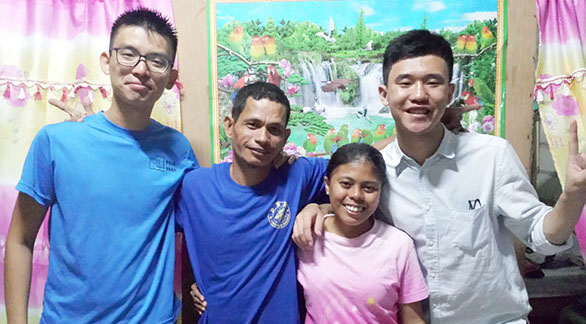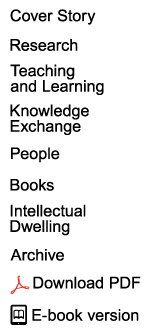
Business law lecturer Beau Lefler has no doubt that fate played a role in his success. He grew up poor, one of 11 children in a Utah family, living on a farm. But his parents taught him to work hard and he did well enough in standardised examinations to get into law school and from there, work in corporate law and travel the world. In 2007, his work brought him to Hong Kong and he and his family used their holidays to visit poorer countries in the region.
“I saw all these hardworking people and it taught me that in part I got lucky because my natural skill set happened to fit well in the time and place I was born,” he said.
That realisation led him to quit his job in 2010 and spend a year volunteering in Ecuador with three children in tow, before joining HKU in 2011 as a lecturer in the Faculty of Business and Economics. It also inspired him to develop a credit-bearing programme for students in which they live and contribute in a developing economy.
For the past three summers, HKU students have been spending three weeks in the Philippines living with host families and advising micro-businesses such as fast food shops, beauty salons and guesthouses on how to improve their businesses through better accounting, social media and other simple measures.
“Most of the people running these businesses are not doing it because they want to but because they can’t find a job elsewhere,” Mr Lefler said. “Typically, they don’t keep records: they don’t know what inventory they have, they don’t know how much money they made in the past year and they don’t know which of their products have the best margins.”
The students help them address these issues using methods that may be less sophisticated than what they learn in the Business Faculty, but have immediate value. Importantly, they involve the owner-operators in designing accounting and record keeping systems that they can understand and sustain, and show them how to extract useful information from their data so they can make good business decisions.
Life-changing experience
Students also get exposure to the daily lives of the business owners and their community through their stay with host families. Two students are placed with each family and they each get a mattress, an electric fan, and daily meals with the family. There is no air-conditioning or WiFi, running water can be intermittent, and mosquitoes are ubiquitous. Yet students find the experience to be incredibly rewarding.
Samuel Chan, a Journalism and Marketing major, worked with a small cooperative producing hand-woven doormats and rugs. The business struggled with profitability and worker absenteeism and lacked expertise in marketing. So he and his partner revamped the business model and pricing strategy, and developed an online presence including brand video, labelling and logo. They also helped the firm apply for national accreditation and grants.
Despite those achievements, the home stay was the most memorable part of the experience, he
said. “It was eye-opening. Despite having so little – my host mother made the equivalent of about
HK$20 a day – they shared all they had with us and were perhaps the happiest people I have ever met.”
Lee Jee Soo, a Psychology and Business Design and Innovation major, worked with a local guesthouse whose records were full of errors. She and her partner digitised the records and discovered the firm had not broken even in some years and had overpaid its taxes. They also helped the firm improve its online presence and modernise its website.
“The experience truly reshaped how I view my life,” she said. “It made me appreciate the things I have been blessed with as someone born and raised in more developed societies (Korea, the US and Hong Kong). But more than that, it made me ask what I really want to do with my life.”
Samuel has already found an answer. He graduated this year and has taken up a position as a corporate social responsibility analyst in a bank.
It is the kind of direction that Mr Lefler hopes for with this programme. “I want them to understand that developing countries are still developing for lots of reasons, not because the people are poor or incapable,” he said. “When these students become leaders in their industries, I hope they will think about the ways that their skill sets and their positions can be used to do good.”
Samuel (first from left) had a great time with his host family in the Philippines.
Samuel worked with a small cooperative producing hand-woven doormats and rugs and helped set up a Facebook page and take product shots for the business.

Life On The Bottom Rungs
Students have been advising owners of small businesses in the Philippines on how to improve their operations through a programme that exposes them to the daily realities in a developing economy.
Students spent three weeks in the Philippines advising micro-businesses such as grocery shops, beauty salons and bakeries on how to improve their businesses.
Mr Beau Lefler


Next
Back
![]() I want them to understand that developing countries are still developing for lots of reasons, not because the people are poor or incapable.
I want them to understand that developing countries are still developing for lots of reasons, not because the people are poor or incapable. ![]()


